- Download Price:
- Free
- Dll Description:
- TRC_CLNT - SQL Server Profiler DLL
- Versions:
- Size:
- 0.39 MB
- Operating Systems:
- Directory:
- P
- Downloads:
- 948 times.
What is Pfclnt80.dll? What Does It Do?
The Pfclnt80.dll library is 0.39 MB. The download links have been checked and there are no problems. You can download it without a problem. Currently, it has been downloaded 948 times.
Table of Contents
- What is Pfclnt80.dll? What Does It Do?
- Operating Systems Compatible with the Pfclnt80.dll Library
- Other Versions of the Pfclnt80.dll Library
- How to Download Pfclnt80.dll Library?
- How to Fix Pfclnt80.dll Errors?
- Method 1: Fixing the DLL Error by Copying the Pfclnt80.dll Library to the Windows System Directory
- Method 2: Copying the Pfclnt80.dll Library to the Program Installation Directory
- Method 3: Doing a Clean Reinstall of the Program That Is Giving the Pfclnt80.dll Error
- Method 4: Fixing the Pfclnt80.dll Error Using the Windows System File Checker
- Method 5: Getting Rid of Pfclnt80.dll Errors by Updating the Windows Operating System
- Common Pfclnt80.dll Errors
- Dynamic Link Libraries Similar to the Pfclnt80.dll Library
Operating Systems Compatible with the Pfclnt80.dll Library
Other Versions of the Pfclnt80.dll Library
The newest version of the Pfclnt80.dll library is the 2000.80.194.0 version released on 2004-01-31. There have been 1 versions released before this version. All versions of the Dynamic link library have been listed below from most recent to oldest.
- 2000.80.194.0 - 32 Bit (x86) (2004-01-31) Download this version
- 2000.80.194.0 - 32 Bit (x86) Download this version
How to Download Pfclnt80.dll Library?
- First, click on the green-colored "Download" button in the top left section of this page (The button that is marked in the picture).
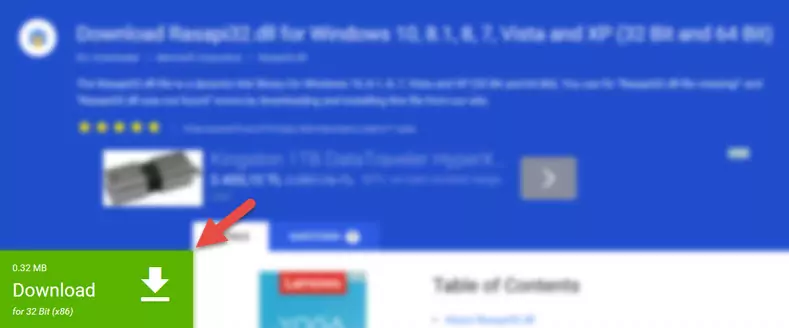
Step 1:Start downloading the Pfclnt80.dll library - "After clicking the Download" button, wait for the download process to begin in the "Downloading" page that opens up. Depending on your Internet speed, the download process will begin in approximately 4 -5 seconds.
How to Fix Pfclnt80.dll Errors?
ATTENTION! Before continuing on to install the Pfclnt80.dll library, you need to download the library. If you have not downloaded it yet, download it before continuing on to the installation steps. If you are having a problem while downloading the library, you can browse the download guide a few lines above.
Method 1: Fixing the DLL Error by Copying the Pfclnt80.dll Library to the Windows System Directory
- The file you will download is a compressed file with the ".zip" extension. You cannot directly install the ".zip" file. Because of this, first, double-click this file and open the file. You will see the library named "Pfclnt80.dll" in the window that opens. Drag this library to the desktop with the left mouse button. This is the library you need.
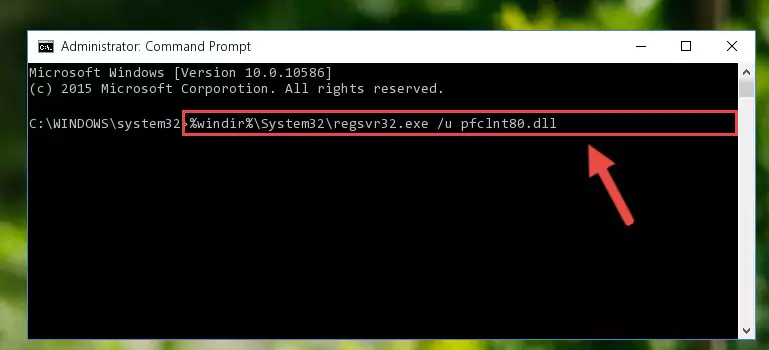
Step 1:Extracting the Pfclnt80.dll library from the .zip file - Copy the "Pfclnt80.dll" library you extracted and paste it into the "C:\Windows\System32" directory.
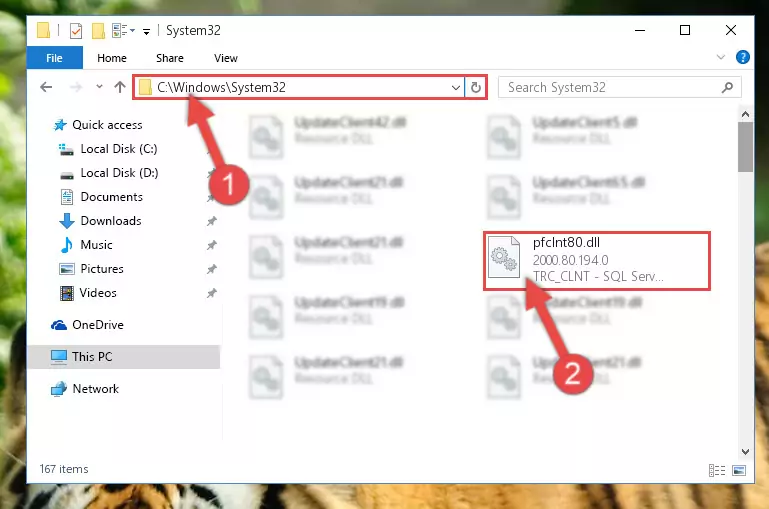
Step 2:Copying the Pfclnt80.dll library into the Windows/System32 directory - If you are using a 64 Bit operating system, copy the "Pfclnt80.dll" library and paste it into the "C:\Windows\sysWOW64" as well.
NOTE! On Windows operating systems with 64 Bit architecture, the dynamic link library must be in both the "sysWOW64" directory as well as the "System32" directory. In other words, you must copy the "Pfclnt80.dll" library into both directories.
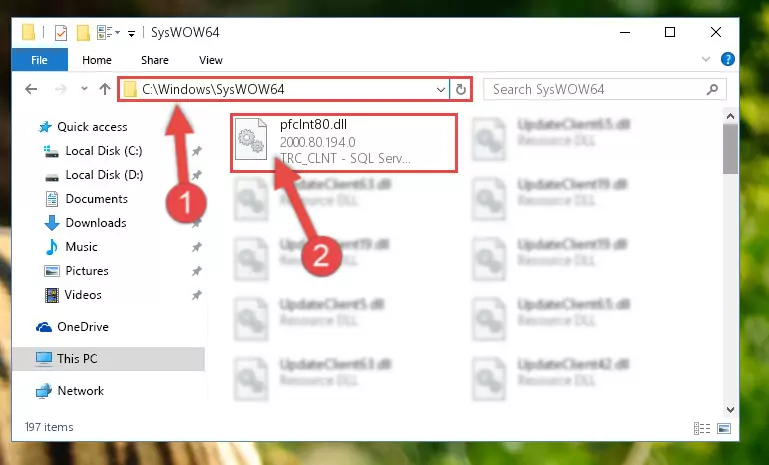
Step 3:Pasting the Pfclnt80.dll library into the Windows/sysWOW64 directory - In order to complete this step, you must run the Command Prompt as administrator. In order to do this, all you have to do is follow the steps below.
NOTE! We ran the Command Prompt using Windows 10. If you are using Windows 8.1, Windows 8, Windows 7, Windows Vista or Windows XP, you can use the same method to run the Command Prompt as administrator.
- Open the Start Menu and before clicking anywhere, type "cmd" on your keyboard. This process will enable you to run a search through the Start Menu. We also typed in "cmd" to bring up the Command Prompt.
- Right-click the "Command Prompt" search result that comes up and click the Run as administrator" option.
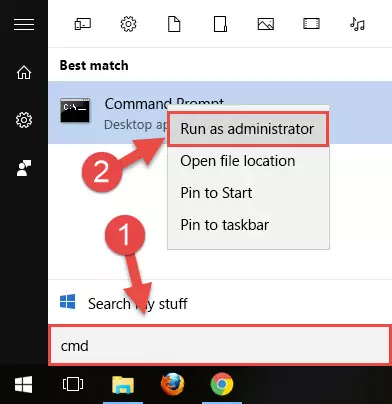
Step 4:Running the Command Prompt as administrator - Paste the command below into the Command Line that will open up and hit Enter. This command will delete the damaged registry of the Pfclnt80.dll library (It will not delete the file we pasted into the System32 directory; it will delete the registry in Regedit. The file we pasted into the System32 directory will not be damaged).
%windir%\System32\regsvr32.exe /u Pfclnt80.dll
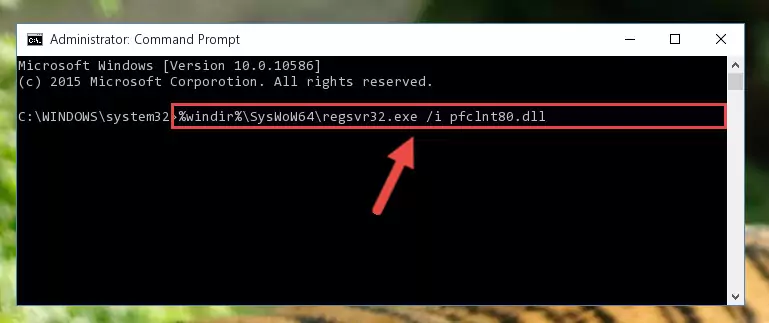
Step 5:Deleting the damaged registry of the Pfclnt80.dll - If you are using a 64 Bit operating system, after doing the commands above, you also need to run the command below. With this command, we will also delete the Pfclnt80.dll library's damaged registry for 64 Bit (The deleting process will be only for the registries in Regedit. In other words, the dll file you pasted into the SysWoW64 folder will not be damaged at all).
%windir%\SysWoW64\regsvr32.exe /u Pfclnt80.dll
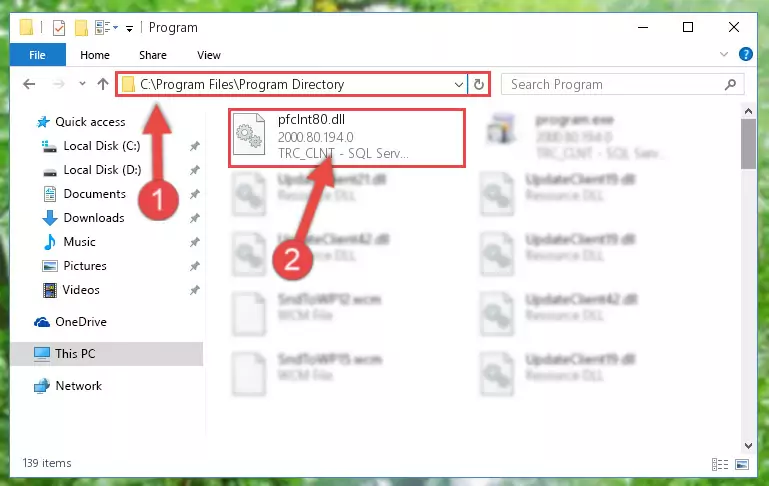
Step 6:Uninstalling the damaged Pfclnt80.dll library's registry from the system (for 64 Bit) - We need to make a new registry for the dynamic link library in place of the one we deleted from the Windows Registry Editor. In order to do this process, copy the command below and after pasting it in the Command Line, press Enter.
%windir%\System32\regsvr32.exe /i Pfclnt80.dll
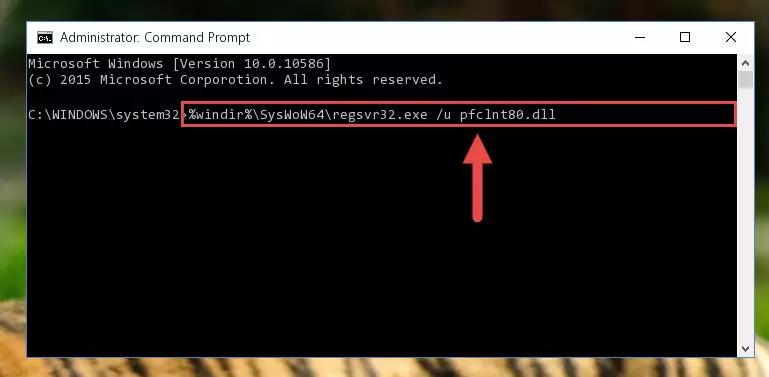
Step 7:Creating a new registry for the Pfclnt80.dll library in the Windows Registry Editor - If you are using a Windows with 64 Bit architecture, after running the previous command, you need to run the command below. By running this command, we will have created a clean registry for the Pfclnt80.dll library (We deleted the damaged registry with the previous command).
%windir%\SysWoW64\regsvr32.exe /i Pfclnt80.dll
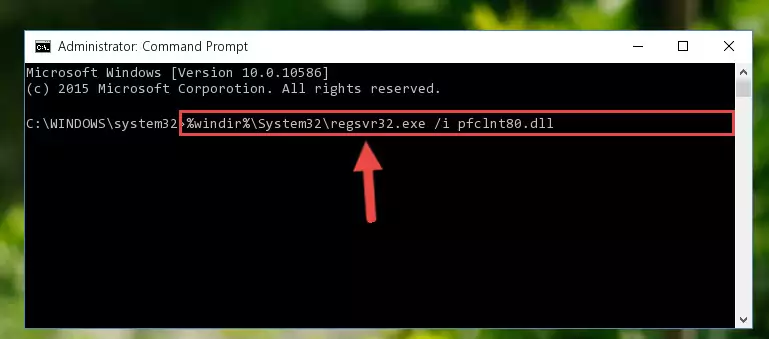
Step 8:Creating a clean registry for the Pfclnt80.dll library (for 64 Bit) - If you did the processes in full, the installation should have finished successfully. If you received an error from the command line, you don't need to be anxious. Even if the Pfclnt80.dll library was installed successfully, you can still receive error messages like these due to some incompatibilities. In order to test whether your dll issue was fixed or not, try running the program giving the error message again. If the error is continuing, try the 2nd Method to fix this issue.
Method 2: Copying the Pfclnt80.dll Library to the Program Installation Directory
- First, you must find the installation directory of the program (the program giving the dll error) you are going to install the dynamic link library to. In order to find this directory, "Right-Click > Properties" on the program's shortcut.
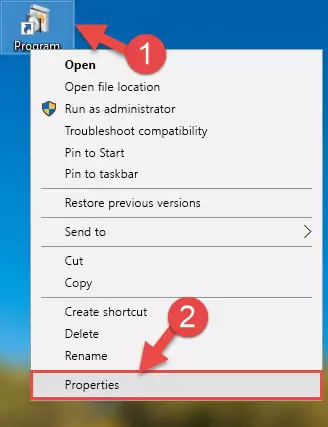
Step 1:Opening the program's shortcut properties window - Open the program installation directory by clicking the Open File Location button in the "Properties" window that comes up.
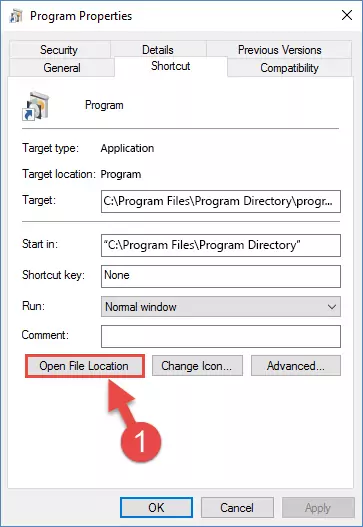
Step 2:Finding the program's installation directory - Copy the Pfclnt80.dll library into this directory that opens.
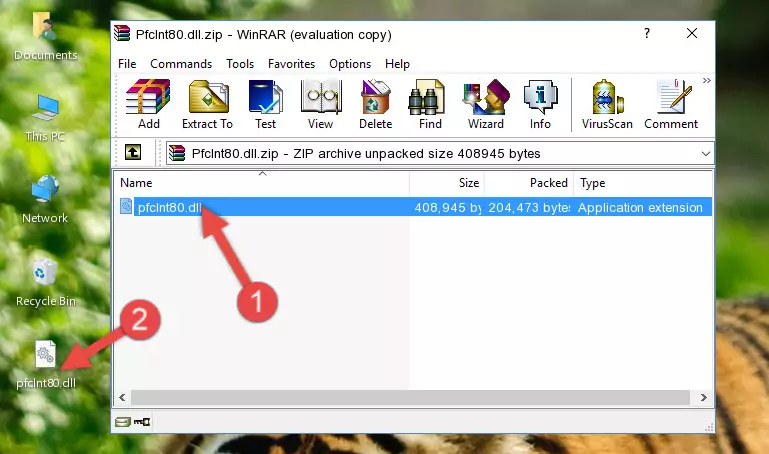
Step 3:Copying the Pfclnt80.dll library into the program's installation directory - This is all there is to the process. Now, try to run the program again. If the problem still is not solved, you can try the 3rd Method.
Method 3: Doing a Clean Reinstall of the Program That Is Giving the Pfclnt80.dll Error
- Open the Run tool by pushing the "Windows" + "R" keys found on your keyboard. Type the command below into the "Open" field of the Run window that opens up and press Enter. This command will open the "Programs and Features" tool.
appwiz.cpl
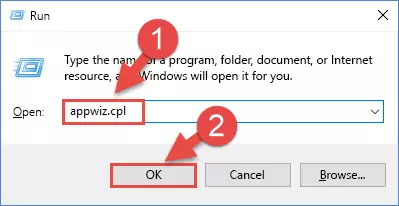
Step 1:Opening the Programs and Features tool with the appwiz.cpl command - The programs listed in the Programs and Features window that opens up are the programs installed on your computer. Find the program that gives you the dll error and run the "Right-Click > Uninstall" command on this program.
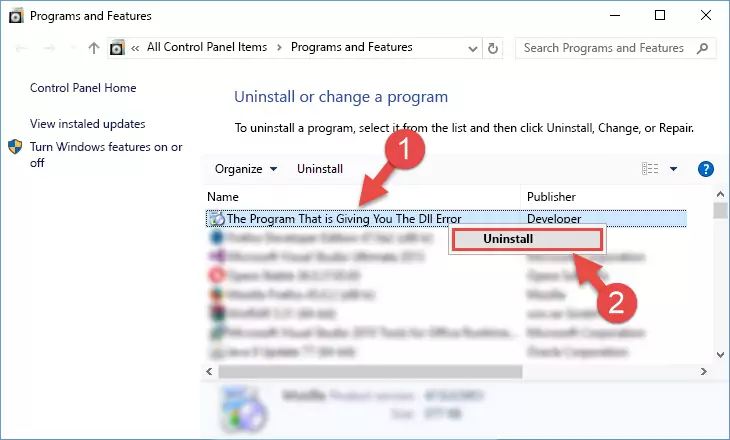
Step 2:Uninstalling the program from your computer - Following the instructions that come up, uninstall the program from your computer and restart your computer.
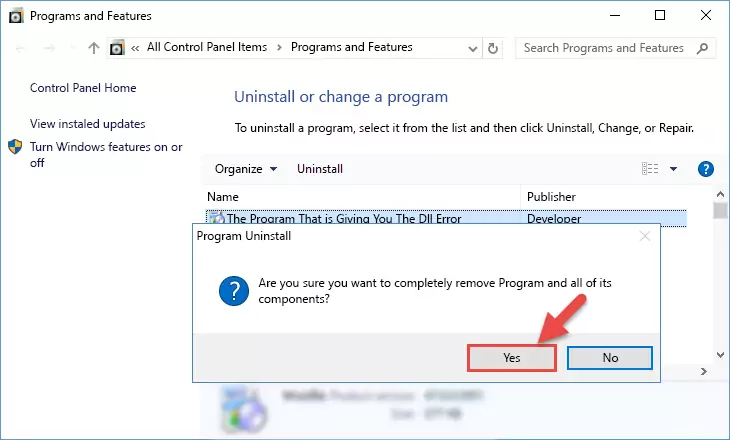
Step 3:Following the verification and instructions for the program uninstall process - 4. After restarting your computer, reinstall the program that was giving you the error.
- This method may provide the solution to the dll error you're experiencing. If the dll error is continuing, the problem is most likely deriving from the Windows operating system. In order to fix dll errors deriving from the Windows operating system, complete the 4th Method and the 5th Method.
Method 4: Fixing the Pfclnt80.dll Error Using the Windows System File Checker
- In order to complete this step, you must run the Command Prompt as administrator. In order to do this, all you have to do is follow the steps below.
NOTE! We ran the Command Prompt using Windows 10. If you are using Windows 8.1, Windows 8, Windows 7, Windows Vista or Windows XP, you can use the same method to run the Command Prompt as administrator.
- Open the Start Menu and before clicking anywhere, type "cmd" on your keyboard. This process will enable you to run a search through the Start Menu. We also typed in "cmd" to bring up the Command Prompt.
- Right-click the "Command Prompt" search result that comes up and click the Run as administrator" option.

Step 1:Running the Command Prompt as administrator - Type the command below into the Command Line page that comes up and run it by pressing Enter on your keyboard.
sfc /scannow
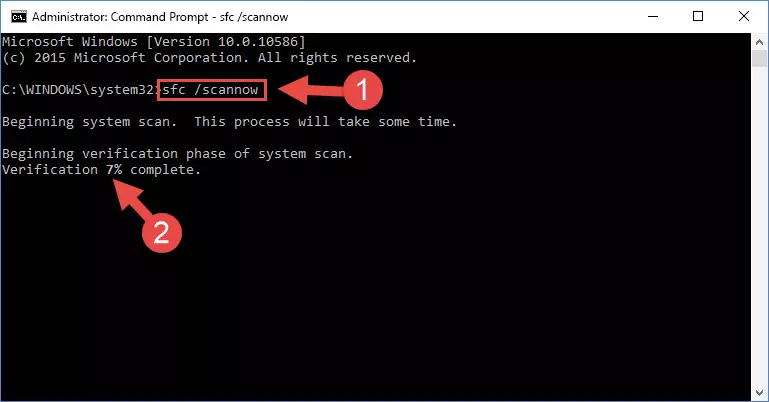
Step 2:Getting rid of Windows Dll errors by running the sfc /scannow command - The process can take some time depending on your computer and the condition of the errors in the system. Before the process is finished, don't close the command line! When the process is finished, try restarting the program that you are experiencing the errors in after closing the command line.
Method 5: Getting Rid of Pfclnt80.dll Errors by Updating the Windows Operating System
Most of the time, programs have been programmed to use the most recent dynamic link libraries. If your operating system is not updated, these files cannot be provided and dll errors appear. So, we will try to fix the dll errors by updating the operating system.
Since the methods to update Windows versions are different from each other, we found it appropriate to prepare a separate article for each Windows version. You can get our update article that relates to your operating system version by using the links below.
Windows Update Guides
Common Pfclnt80.dll Errors
When the Pfclnt80.dll library is damaged or missing, the programs that use this dynamic link library will give an error. Not only external programs, but also basic Windows programs and tools use dynamic link libraries. Because of this, when you try to use basic Windows programs and tools (For example, when you open Internet Explorer or Windows Media Player), you may come across errors. We have listed the most common Pfclnt80.dll errors below.
You will get rid of the errors listed below when you download the Pfclnt80.dll library from DLL Downloader.com and follow the steps we explained above.
- "Pfclnt80.dll not found." error
- "The file Pfclnt80.dll is missing." error
- "Pfclnt80.dll access violation." error
- "Cannot register Pfclnt80.dll." error
- "Cannot find Pfclnt80.dll." error
- "This application failed to start because Pfclnt80.dll was not found. Re-installing the application may fix this problem." error
